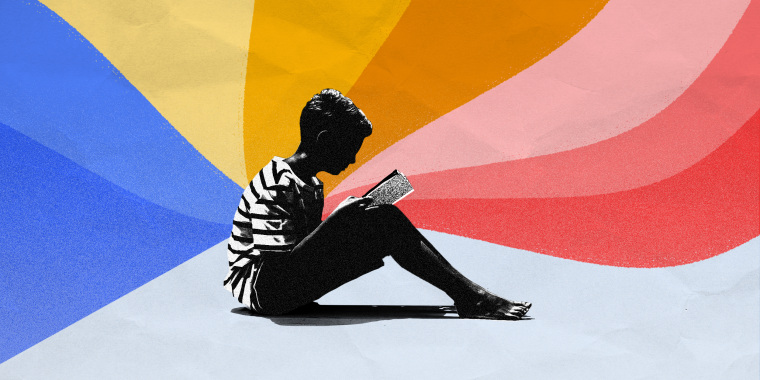The school board in Virginia’s Spotsylvania County voted Monday to have staff start removing books with “sexually explicit” content from the district’s libraries. Two members of the board suggested removal might not be enough — it would be better to see the books burned, they said.
The truth is the books under examination are rarely too difficult for students to handle — it’s their parents who struggle.
There are school boards across the country thinking along similar lines, acting on similar pressures to “protect” children from works that deal in particular with LGBTQ, gender or racial themes. Too often the proposed solution is to remove the offending books from shelves, whether recent works or those considered classics. This year alone we’ve seen these plays at censorship aimed at books like “The Hate U Give” in Tennessee, “Losing the Girl” in Texas, “The Handmaid’s Tale” in Kansas and Toni Morrison’s “The Bluest Eye” in Virginia.
I understand it must be terrifying for parents to send their children off to school, where they’re outside their control for the majority of the day. That fear is part of why Republicans have been so successful in recent campaigns against “critical race theory” and transgender youth in sports. However, the truth is the books under examination are rarely too difficult for students to handle — it’s their parents who struggle.
That’s certainly the case with Maia Kobabe’s memoir “Gender Queer.” The award-winning exploration of gender identity has now been banned from schools in multiple states. Last week, the Orange County school board in Florida became the latest to rip the graphic novel from high school shelves at the behest of local mom Alicia Farrant, the Orlando Sentinel reported:
"My biggest issue is who is ordering these books and why is there no safeguard?" said Alicia Farrant, who brought the book to an Orange County School Board meeting last week after her children, at her request, checked it out of the Boone High School library. "There should be no pornography allowed in schools."
(Farrant, who with her husband runs a company that organizes Christian overseas mission work, also just happened to be one of the parents who lobbied against mask mandates in Orlando schools.)
In Spotsylvania, it was the novel “33 Snowfish” that sparked the latest round of fretting. The Young Adult Library Services Association named the book one of its best books for young adults in 2004. It’s definitely a dark story, one that Publishers Weekly described as a “dark tale about three runaways who understand hatred and violence better than love.”
According to The Free Lance-Star, the book came to the board’s attention thanks to a mother who had initially been concerned with LGBTQ works in the library’s digital loan app. That she instead found “33 Snowfish” was just a happy coincidence. Rather than remind the parent that high school students are expected to grapple with heavy concepts, the board jumped straight to censorship. The Free-Lance Star reported:
Two board members, Courtland representative Rabih Abuismail and Livingston representative Kirk Twigg, said they would like to see the removed books burned.
“I think we should throw those books in a fire,” Abuismail said, and Twigg said he wants to “see the books before we burn them so we can identify within our community that we are eradicating this bad stuff.”
Abuismail is a perfect example of why it’s a mistake to dismiss this surge of censorship as the exclusive work of stodgy old white prigs. The 24-year-old was born in Beirut and first won his seat on the local school board in 2019, the youngest person to ever hold elected office in the county.
“As a Christian who’s super involved in youth ministry, right, I’m not even OK for those books staying in those libraries overnight,” Abuismail said at Monday’s meeting. “If we could get a team to go clean the books out tonight, I’d do it.”
In all of the cases listed, it’s been parents — often just one parent, as was the case in the Goddard school district in Wichita, Kansas — who’ve been upset and confused by the content available in libraries, not students.
What’s often lost in this discussion, though, is that many of the maligned books are there for high school students to read and digest. These parents’ attempts to block access to these works is as limiting as it is insulting to the teenagers they’re supposedly protecting. And even if younger children have access to these books, I can’t imagine being a parent upset that my child is reading more advanced material.
The most fear is directed at challenging, complicated books that deal with the exact sort of struggles and themes that many parents would prefer their children never face in real life. But the students who most need to read many of these books are the ones who are struggling with these issues in real life.
These parents’ attempts to block access to these works is as limiting as it is insulting to the teenagers they’re supposedly protecting.
“Please, leave the queer books on the library shelves, where the queer teens can find them,” "Gender Queer" author Kobabe wrote in a Washington Post op-ed last month, noting that the claim their work is pornography is "a common accusation against work with themes of queer sexuality."
“As a queer teen, I desperately needed them. And the queer teens of today need them too," they wrote.
I agree wholeheartedly. On the same note, it would be helpful if these watchdog parents can clarify what their stance is toward their teens especially. Is it that liberals have coddled and encouraged America’s youth to be precious snowflakes who all expect a trophy? Or is it that all children should be safeguarded from the realities of the world until they’re 18, especially on matters of race and sex?
It can’t be both.

